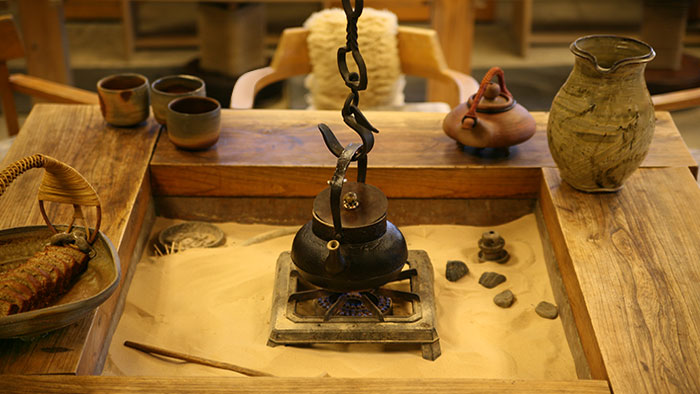 Home
Home
Tour the Pottery
Benedictine Hospitality and the Tea Table

Visitors are welcome Monday through Friday 1:15–4:30 p.m. and Saturday 10 a.m.–4:30 p.m. Staff are often available to give tours, though it is recommended to schedule solo and group tours in advance via email or by calling (320) 363-2930. Note: from July to October of a kiln firing year, the studio is not available for tours due to preparations related to the Johanna Kiln.
In addition to tours and purchases, guests are welcome to 3 p.m. afternoon tea at the irori table. An irori is a traditional Japanese hearth and table used for heating tea water and food as well as for generating warmth in the home. The table at the studio is most often used for tea, and on occasion it is used to prepare a meal over the central burner.
Welcoming guests into the studio as part of a rural and traditional Japanese framework for a lived system has strong parallels to the practice of Benedictine hospitality. As Saint Benedict states, “All guests who present themselves are to be welcomed as Christ, for he himself would say: I was a stranger and you welcomed me.”
Water for tea is heated in an antique cast iron kettle hung from the ceiling using a traditional jizaikagi pot hook. The water is then carefully poured over tea leaves into a wood-fired ceramic teapot. Except for tea ceremonies and other seasonal or special occasions, the tea served in the studio is a worker’s grade organic sencha green tea from the mountains of Japan.
Tea is served in a chawan tea bowl. Shallow bowls, which allow the tea to cool rapidly, are used in summer; deep bowls are used in winter. Other tea implements include the mizusashi water jar, chaire tea caddy, and kansui rinse water container. Special meals prepared around the irori table include nabe-style Japanese kettle soups, stir-frys, and noodle dishes.